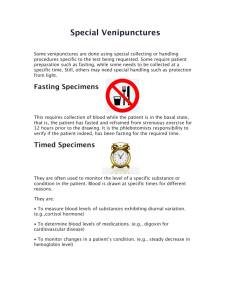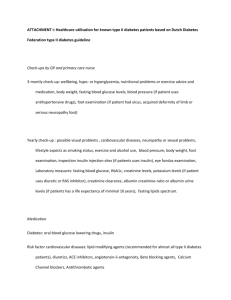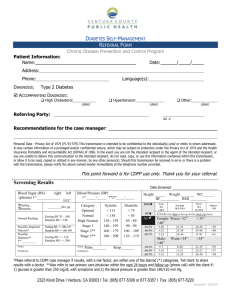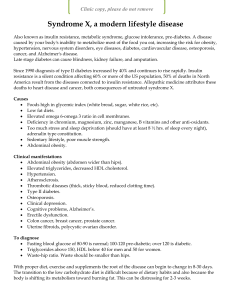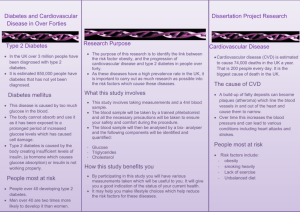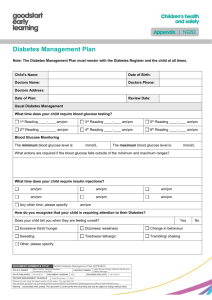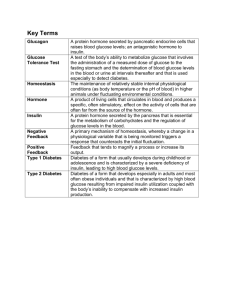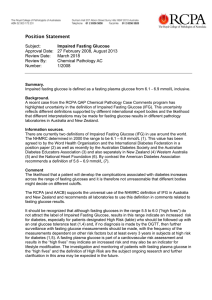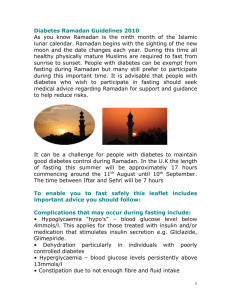Fasting during Yom Kippur (Day of Atonement) and
advertisement
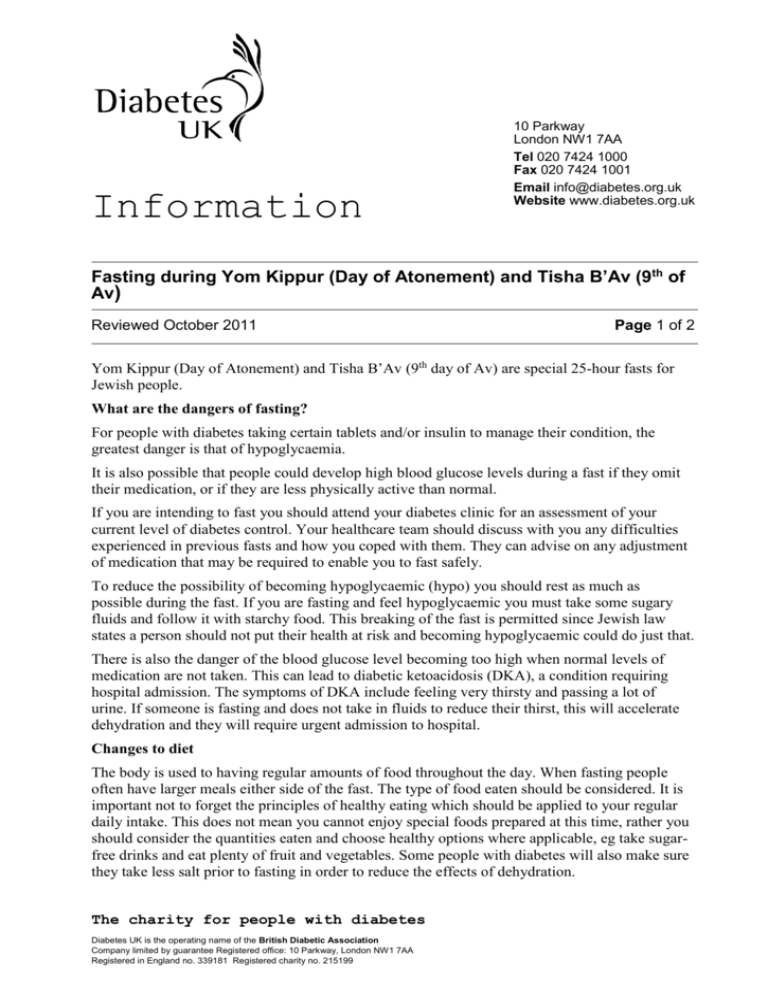
Information 10 Parkway London NW1 7AA Tel 020 7424 1000 Fax 020 7424 1001 Email info@diabetes.org.uk Website www.diabetes.org.uk Fasting during Yom Kippur (Day of Atonement) and Tisha B’Av (9th of Av) Reviewed October 2011 Page 1 of 2 Yom Kippur (Day of Atonement) and Tisha B’Av (9th day of Av) are special 25-hour fasts for Jewish people. What are the dangers of fasting? For people with diabetes taking certain tablets and/or insulin to manage their condition, the greatest danger is that of hypoglycaemia. It is also possible that people could develop high blood glucose levels during a fast if they omit their medication, or if they are less physically active than normal. If you are intending to fast you should attend your diabetes clinic for an assessment of your current level of diabetes control. Your healthcare team should discuss with you any difficulties experienced in previous fasts and how you coped with them. They can advise on any adjustment of medication that may be required to enable you to fast safely. To reduce the possibility of becoming hypoglycaemic (hypo) you should rest as much as possible during the fast. If you are fasting and feel hypoglycaemic you must take some sugary fluids and follow it with starchy food. This breaking of the fast is permitted since Jewish law states a person should not put their health at risk and becoming hypoglycaemic could do just that. There is also the danger of the blood glucose level becoming too high when normal levels of medication are not taken. This can lead to diabetic ketoacidosis (DKA), a condition requiring hospital admission. The symptoms of DKA include feeling very thirsty and passing a lot of urine. If someone is fasting and does not take in fluids to reduce their thirst, this will accelerate dehydration and they will require urgent admission to hospital. Changes to diet The body is used to having regular amounts of food throughout the day. When fasting people often have larger meals either side of the fast. The type of food eaten should be considered. It is important not to forget the principles of healthy eating which should be applied to your regular daily intake. This does not mean you cannot enjoy special foods prepared at this time, rather you should consider the quantities eaten and choose healthy options where applicable, eg take sugarfree drinks and eat plenty of fruit and vegetables. Some people with diabetes will also make sure they take less salt prior to fasting in order to reduce the effects of dehydration. The charity for people with diabetes Diabetes UK is the operating name of the British Diabetic Association Company limited by guarantee Registered office: 10 Parkway, London NW1 7AA Registered in England no. 339181 Registered charity no. 215199 Yom Kippur and Tisha B’Av Page 2 of 2 People whose diabetes is controlled by diet and physical activity alone should be able to fast but this should be discussed with your healthcare team. This is especially important before Yom Kippur and Tisha B’Av, as these are prolonged periods of fasting and could cause blood glucose levels to rise even though you are not eating. Changes to treatment The body will have difficulties maintaining adequate blood glucose levels during the period of fasting, so adjustments need to be made to any prescribed medication. If you are taking insulin it is important that your control is good before you consider fasting. Your healthcare team may advise against fasting if you have poor control or if there is evidence of complications due to diabetes. You will require less insulin before the start of the fast, and the type of insulin may also need changing from your usual type. Pre-mixed insulin is not recommended for people who are intending to fast. Due to the dangers of omitting insulin for 25 hours, you may be advised not to fast for this length of time. Your healthcare team should advise on what is best for you. If you take tablets to control your blood glucose it may be possible to alter the time and/or dose during the fast. This will depend on the type of medication you are taking. Your doctor might suggest changing to an alternative tablet in order to prevent large variations in blood glucose levels whilst fasting. It is not recommended that tablets be omitted for the full 25 hours due to the danger of raised blood glucose levels. You need to discuss this with your healthcare team. Other factors to consider If there is evidence of any damage to your eyes, kidneys, heart or the nerves in your hands and feet, it would not be advisable for you to fast. You must talk to your healthcare team about this as they will know the extent of any existing damage due to high blood glucose levels, and will be able to advise on the risk of further damage if you follow the fast. Many people with diabetes on tablets or insulin would not be medically advised to fast for the longer periods and, if this is the case for you, this should be discussed with your rabbi in order to obtain permission not to fast. If medication is recommended during the fast, this should also be discussed with your rabbi. Careline Information Team © Diabetes UK 2011
